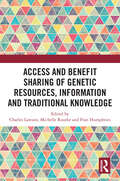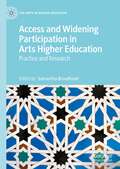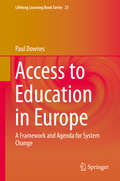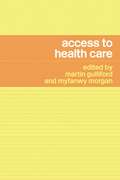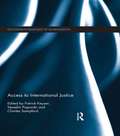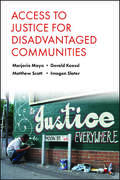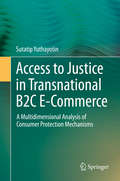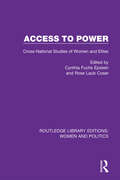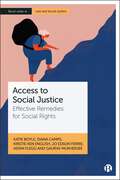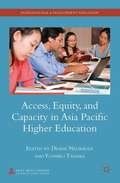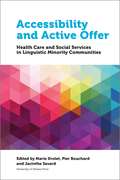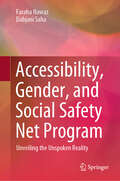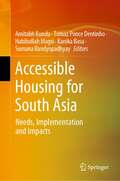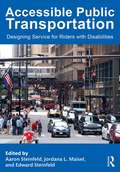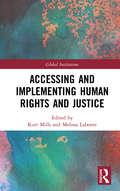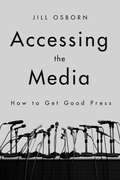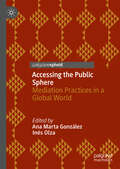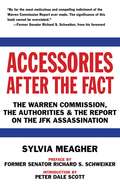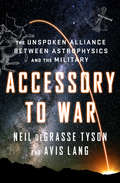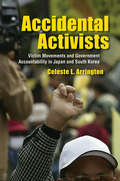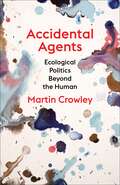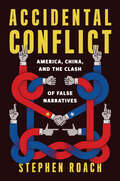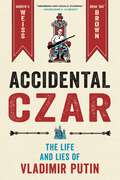- Table View
- List View
Access To Power
by Robert EllisDrawing on his experience as a high-profile media consultant, first-time author Ellis spins a potent political thriller that deftly conveys the superficiality and shrewdness of life on Capitol Hill. When renowned image-maker Frank Miles is hired to wage a no-holds-barred advertising blitz for Mel Merdock, a senatorial candidate with deep pockets and few morals, Frank's primary concern is to win the race, even if his client isn't the best man for the job. Three weeks prior to election day, Frank's longtime business partner and friend, Woody, is murdered during what appears to be a botched robbery. Unable to shake the feeling that Woody's death was no accident and aware of the considerable enemies his sometimes sleazy media schemes have earned him, Frank does some investigating of his own and uncovers a shocking trail of corruption that leads all the way to the White House. Ellis writes in crisp, punchy prose, mirrored by the novel's short, sound bite-like chapters, which are skillfully woven to form an absorbing narrative. A side story involving a romance between Frank and an associate is a pleasing touch, and Ellis's painstaking attention to character development, pacing and detail will ensure that this hard-hitting debut will leave conspiracy buffs hungering for more.
Access and Benefit Sharing of Genetic Resources, Information and Traditional Knowledge
by Charles Lawson, Michelle Rourke and Fran HumphriesAddressing the management of genetic resources, this book offers a new assessment of the contemporary Access and Benefit Sharing (ABS) regime. Debates about ABS have moved on. The initial focus on the legal obligations established by international agreements like the United Nations Convention on Biological Diversity and the form of obligations for collecting physical biological materials have now shifted into a far more complex series of disputes and challenges about the ways ABS should be implemented and enforced. These now cover a wide range of issues, including: digital sequence information, the repatriation of resources, technology transfer, traditional knowledge and cultural expressions, open access to information and knowledge, naming conventions, farmers’ rights, new schemes for accessing pandemic viruses sharing DNA sequences, and so on. Drawing together perspectives from an interdisciplinary range of leading and emerging international scholars, this book offers a new approach to the ABS landscape; as it breaks from the standard regulatory analyses in order to explore alternative solutions to the intractable issues for the Access and Benefit Sharing of genetic resources. Addressing these modern legal debates from a perspective that will appeal to both ABS scholars and those with broader legal concerns in the areas of intellectual property, food, governance, Indigenous issues, and so on, this book will be a useful resource for scholars and students as well as those in government and in international institutions working in relevant areas.
Access and Widening Participation in Arts Higher Education: Practice and Research (The Arts in Higher Education)
by Samantha BroadheadThis volume brings together a range of practitioners, managers, and researchers who work within the field of arts higher education to reflect on strategies to increase access and widening participation (WP). The issues presented in this book are situated within a wider global context where countries are seeking greater harmonisation of higher education as students and workers become more mobile, crossing international borders. The chapter authors address various issues within higher education institutions from a WP context, including areas such as creative writing, music, art and design. In exploring these issues the editor and her chapter authors seek to answer how those teaching in arts higher education can promote the value and quality of their work while ensuring fair access and wide participation for all.
Access to Education in Europe: A Framework and Agenda for System Change (Lifelong Learning Book Series #21)
by Paul DownesThis book identifies key elements of an international framework to develop systems-level change to promote access to education, including higher education, for socio-economically marginalized groups. It is based on interviews with senior government officials and senior management in universities, non formal education and prisons across 12 countries in Europe. The book identifies systemic obstacles to and opportunities for promotion of access to education for socio-economically excluded groups that are issues transferable to other countries' contexts. It adopts a systemic focus on access across a range of domains of education, both formal higher education and non-formal education, as well as prison education. Through a focus on a more dynamic structuralist systems framework it develops an innovative post-Bronfenbrennerian view of system levels in lifespan developmental and educational psychology. It also develops an international agenda for reform in relation to these various system levels for access to education for socio-economically marginalized groups, through extraction of key structural indicators to evaluate reform progress in a transparent, culturally sensitive manner. The book identifies current gaps and strengths in policy, practice and structures that impact upon access to education, including higher education, across a range of countries. These gaps and strengths are illustrative and are to inform a strategic approach to system level change and development for the promotion of access to education for socio-economically marginalized groups in Europe and beyond. "Too many educational practices entrench social exclusion: it is an urgent priority across Europe that social justice policies are implemented for the inclusion of marginalised groups. Paul Downes' analysis of these issues is timely. His conclusions are considered and practical: this book is a valuable and constructive resource for practitioners, academics and the policy community. " Professor Alistair Ross, Jean Monnet ad Personam Professor of Citizenship Education in Europe, Emeritus Professor of Education, Institute for Policy Studies in Education, London Metropolitan University
Access to Health Care
by Martin Gulliford Myfanwy MorganTo what extent can we have truly universal, comprehensive and timely health services, equally available to all? Access to Health Care considers the meaning of 'access' in health care and examines the theoretical issues that underpin these questions. Contributors draw on a range of disciplinary perspectives to investigate key aspects of access, including:· geographical accessibility of services· socio-economic equity of access· patients' help-seeking behaviour· organisational problems and access· methods for evaluating access.Access is considered in both a UK and international context. The book includes chapters on contrasting health policies in the United States and European Union. Access to Health Care provides both health care researchers as well as health professionals, managers and policy analysts, with a clear and wide-ranging overview of topical and controversial questions in health policy and health services organization and delivery.
Access to International Justice (Challenges of Globalisation)
by Vesselin Popovski Charles Sampford Patrick KeyzerThere is much debate about the scope of international law, its compatibility with individual state practice, its enforceability and the recent and limited degree to which it is institutionalized. This collection of essays seeks to address the issue of access to justice, the related element of domestic rule of law which does not yet figure significantly in debates about international rule of law. Even in cases in which laws are passed, institutions are present and key players are ethically committed to the rule of law, those whom the laws are intended to protect may be unable to secure protection. This is an issue in most domestic jurisdictions but also one which poses severe problems for international justice worldwide. The book will be of interest to academics and practitioners of international law, environmental law, transitional justice, international development, human rights, ethics, international relations and political theory.
Access to Justice for Disadvantaged Communities
by Marjorie MayoAccess to justice for all, regardless of the ability to pay, has been a core democratic value. But this basic human right has come under threat through wider processes of restructuring, with an increasingly market-led approach to the provision of welfare. Professionals and volunteers in Law Centres in Britain are struggling to provide legal advice and access to welfare rights to disadvantaged communities. Drawing upon original research, this unique study explores how strategies to safeguard these vital services might be developed in ways that strengthen rather than undermine the basic ethics and principles of public service provision. The book explores how such strategies might strengthen the position of those who provide, as well as those who need, public services, and ways to empower communities to work more effectively with professionals and progressive organisations in the pursuit of rights and social justice agendas more widely.
Access to Justice in Transnational B2C E-Commerce: A Multidimensional Analysis of Consumer Protection Mechanisms
by Sutatip YuthayotinThis book identifies institutional mechanisms that can be used to promote consumer confidence in direct online sales with businesses (B2C e-commerce). It argues that enhancing the access to justice in a multidimensional sense can potentially offer an effective means of boosting consumer confidence. It introduces a conceptual framework for a multidimensional approach to access to justice in the context of consumer protection, describing the various reasonable criteria needed to satisfy consumer demands in B2C e-commerce. The framework, which reflects all essential aspects of consumers' expectations when they engage in online transactions, provides a benchmark for the evaluation of various consumer protection mechanisms. Based on an analysis of different mechanisms and using the framework's criteria, the practice of private ordering, which does not rely on the creation of rules of law but rather on the use of technology as a solution, appears to offer a meaningful way to enhance access to justice in B2C e-commerce. However, though private ordering holds considerable potential, certain weaknesses still need to be eliminated. This book demonstrates how private ordering can be successfully implemented with the help of an intermediary, a neutral third party that plays an integral part in the collaborative task of facilitating various aspects of private ordering, thus helping to limit the risks of failure and ensuring a fairer market setting. In order to move forward, it argues that the state, with its wealth of material resources and incentive options, is the institution best suited to acting as an intermediary in facilitating private ordering. This promising proposal can improve consumer protection, which will in turn boost consumer confidence.
Access to Power: Cross-National Studies of Women and Elites (Routledge Library Editions: Women and Politics)
by Cynthia Fuchs Epstein and Rose Laub CoserOriginally published in 1981, this book is composed of papers that describe and analyse women’s careers in government, business, and the professions. It examines women’s access to and participation in elite careers in the US, and in selected countries of western and eastern Europe – Britain, France, West Germany, Austria, Norway, Finland, Poland, and Yugoslavia – as well as in international organizations. This book was an outgrowth of a conference on ‘Women in decision-making elites in cross-national perspective,’ held at King’s College, Cambridge University, in July 1976. The countries represented were chosen because, although they were at similar stages of economic development, they exhibited differences in political structure, ideology, and tradition.
Access to Social Justice: Effective Remedies for Social Rights (Bristol Studies in Law and Social Justice)
by Katie Boyle Diana Camps Kirstie English Jo Ferrie Aidan Flegg Gaurav MukherjeeAvailable open access digitally under CC-BY-NC-ND licence. This book proposes a conception of social justice according to international human rights law. Social rights include everyday rights such as housing, food, fuel and social security. Drawing on extensive research with frontline practitioners, the book frames access to social justice as a journey that should end with the realisation of an effective remedy. It highlights discourses that marginalise and disempower rights holders and reclaims the narrative around social rights as legal rights. This is a unique contribution to our understanding of access to social justice from a social rights perspective complete with key recommendations for policy and practice.
Access, Equity, and Capacity in Asia-Pacific Higher Education
by Deane Neubauer Yoshiro TanakaHigher education is growing most rapidly in the Asia-Pacific region, and policy makers are facing the task of balancing quality and quantity. This book will help readers understand the current situation of higher education not only in this region but everywhere that they may work. ' - Shinichi Yamamoto, Hiroshima University, Japan
Accessibility and Active Offer: Health Care and Social Services in Linguistic Minority Communities (Health and Society)
by Marie Drolet, Pier Bouchard and Jacinthe SavardIt is imperative that we train leaders who are able to intervene efficiently with service users and to support a better organization of the workplace. It is especially important to look at the many issues related to postsecondary training and human resources, such as recruiting and keeping these leading professionals. Accessibility and Active Offer thus combines theory and empirical data to help future professionals understand the workplace issues of accessibility and active offer of minority-language services. This English-language adaptation of Accessibilité et offre active features an additional chapter by Richard Bourhis on issues specific to Anglophone communities in Québec. This multidisciplinary collective work is the first to unite researchers in health, social work, sociology, political science, public administration, law and education, in order to gain more thorough knowledge of linguistic issues in health and social services, as well as of active offer of French-language services. Published in English.
Accessibility, Gender, and Social Safety Net Program: Unveiling the Unspoken Reality
by Faraha Nawaz Dabjani SahaThis book offers an extensive research work to explore the accessibility of women with disabilities and financial insolvency to social safety net program in rural Bangladesh. The book examines the impact of intersectional identities in accessibility to the human rights in a contextual setting. The authors have also scrutinized the existing policies to identify policy gaps and provide some policy recommendations from this insightful study. Apart from narrower view of the targeting method or implementation of social safety net program on targeting beneficiaries, this research has combined gender and disability in a study framework with making a focus on the Allowances Program for Insolvent Persons with Disabilities provided by Government of Bangladesh. They have argued that intersectional identities (gender, disability, financial insolvency) have influenced over the accessibility to social safety net program as well as identified the challenges of accessibility which provides a broader view of practices of public administration of Bangladesh and enlightens on social and cultural context creating barriers in accessibility to human rights of women with disabilities. The authors argue for bringing changes of the service delivery of the program by bringing change in policies according to human right-based treaties. This book is useful to policy makers, international donor agencies, government officials, and NGOs.
Accessible Housing for South Asia: Needs, Implementation and Impacts
by Amitabh Kundu Sumana Bandyopadhyay Tomaz Ponce Dentinho Habibullah Magsi Kanika BasuThis book deals with important issues related to urban housing in South Asia. It analyses various aspects of housing, including spatial and temporal requirements and needs, as well as the challenges of implementing housing projects, such as financial feasibility of estate development projects and housing design. Finally, it discusses the socio-economic and environmental impacts of the rapid urban housing development in South Asia. Written by experts from various disciplines, the book presents several case studies that address issues such as housing provision; legislative, financial and technical support; access to employment opportunities and markets; the cumulative impact on gentrification; exclusion and spatial equity; and the economic, social and environmental sustainability of urban tissue. Researchers, housing planners, and policy makers will find this book a valuable resource in meeting the demand for affordable and sustainable housing and overcoming housing shortages in developing countries
Accessible Public Transportation: Designing Service for Riders with Disabilities
by Edward Steinfeld Jordana L. Maisel Aaron SteinfeldThe United States is home to more than 54 million people with disabilities. This book looks at public transit and transportation systems with a focus on new and emerging needs for individuals with disabilities, including the elderly. The book covers the various technologies, policies, and programs that researchers and transportation stakeholders are exploring or putting into place. Examples of innovations are provided, with close attention to inclusive solutions that serve the needs of all transportation users.
Accessing and Implementing Human Rights and Justice (Global Institutions)
by Melissa Labonte Kurt MillsAccessing human rights and justice mechanisms is a pressing issue in global politics. Although an understanding of justice is inherent in broad human rights discourses, there is no clear consensus on how to develop adequate means of accessing them in order to make a difference to people’s lives. Further, expansions of the boundaries of both human rights and justice make any clear and settled understanding of the relation difficult to ascertain. This volume tackles these issues by focusing on the dilemmas of accessing and implementing human rights and justice across a range of empirical contexts while also investigating a range of conceptual approaches to, and understandings of, justice, including issues of equality, retribution, and restoration, as well as justice as a transnational professional project. The contributors, representing a range of disciplinary backgrounds and diverse voices, offer empirical examples from Afghanistan, Democratic Republic of the Congo, Syria, Tunisia, and Uganda to explore the issues of accessing and implementing human rights and justice in conflict, post-conflict, and transitional settings. This work will be of interest to students and scholars of international relations, human rights, international criminal justice, and conflict response.
Accessing the Media: How to Get Good Press
by Jill OsbornAccessing the Media takes the reader behind the scenes to understand how best to work with press to get publicity. Perfect for politicians, business leaders, lobbyists, and media junkies, this reference provides an insider's look at how the modern newsroom works, detailing the different roles of reporters, editors, and producers. Readers will learn how to forge relationships with media personnel in television, radio, print, and the web to craft the press coverage they want.Award-winning journalist Jill Osborn exposes the three strategic steps that must be used to gain favorable coverage with the media at just the right time. She gives you the inside scoop on how to think like a national or local journalist so you can control the headlines. And she even provides sample press releases to help shape your message. When reading Accessing the Media, you will have a personal media consultant without the cost of hiring one.Whether you are running for office, looking to improve visibility for your business, or simply want a deeper understanding of what you see and read in the news, Accessing the Media is the perfect guide to getting your story out to the world.
Accessing the Public Sphere: Mediation Practices in a Global World
by Ana Marta González Inés OlzaThis edited volume focuses on the (un)equal access to the public space granted to the various groups that make up hybrid and multicultural societies: i.e. majority vs minority groups, immigrants vs non-immigrants, and so forth. With ‘access to public space’ the authors refer not only to participation through discursive practices in the public arena (e.g. political, social and institutional debates) but also to a full operationalization of the knowledge, habits and opportunities attached to true citizenship. Furthermore, in contexts of inequality and sociocultural conflict, the role of mediators has always been underscored as third-party figures (in)formally acknowledged and authorized–by participants in the interaction and/or external bodies–to set the ground for mutual understanding and foster balanced communication. Such mediation can range from interpreting in legal and medical encounters to dispute-resolution practices in situations of sociocultural clash among groups or individuals. Therefore, as is shown by the contributions in this volume, (intercultural) mediators are key agents in facilitating integration and providing disadvantaged groups with effective tools to gain access to the public sphere.
Accessories After the Fact: The Warren Commission, the Authorities & the Report on the JFK Assassination
by Peter Dale Scott Richard S. Schweiker Sylvia MeagherOriginally published in 1967, Meagher's masterful dissection of the Warren Report, based on the Warren Commission's own evidence, has stood the test of time. In some cases, declassifications of government records have corroborated the author's suspicions and analyses, such as her amazing assertion that Oswald had never actually been charged with Kennedy's murder, despite sworn testimony to the contrary. Meagher's book raises serious questions not only about Oswald's guilt in the JFK assassination and related crimes, such as the Tippit murder and the Walker shooting, but also about the methods and honesty of the Warren Commission, the FBI, and various Dallas police and other officials.When the Church Committee first began to re-examine the Warren Commission and its relationship with intelligence agencies in 1975, investigators were shocked by what they discovered. In Accessories After the Fact, Sylvia Meagher delivers a blistering blow to the credibility of the Warren Report, and decades after its original publication researchers and readers are still discovering what made her work so important.
Accessory Apartments in Single-family Housing
by Martin GellenAs the reproduction cost of housing has increased, consumers have made intensive use of existing dwellings. Conversions of the housing stock have regained prominence as a source of supply. This book introduces the accessory apartment and assesses its potential as an emerging resource for meeting local and national housing needs. Although accessory apartments help meet some of the nation's housing needs, they are not entirely without problems. Some of these are environmental problems, such as physical alterations that are out of character with the design and appearance of surrounding structures, while other problems are cultural and ideological. The accessory apartment in a single-family house deviates from the image of housing, family, and neighborhood that prevails in American culture. It symbolizes a change in the way the single-family house is used and the kinds of people who live in it. These changes clash with the traditional meanings attached to the categories of residential zoning. Martin Gellen evaluates and answers the following questions throughout the text: How do we live with accessory apartments? Control their number? Ensure their soundness?--and maintain neighborhood standards? He focuses on the physical planning problems of conversions and examines the zoning issues they raise. This includes a realistic appraisal of the purposes of density and occupancy controls in exclusive single-family districts. The author provides new methods for regulation of density and occupancy which permit more flexible use of single-family housing to meet the housing needs of a more diverse population. Whether in an aging suburb or new tract, the accessory apartment is a current challenge. This book provides a clear headed approach toward a popular trend in the ever changing housing industry.
Accessory to War: The Unspoken Alliance Between Astrophysics And The Military
by Avis Lang Neil DeGrasse TysonAn exploration of the age-old complicity between skywatchers and warfighters, from the best-selling author of Astrophysics for People in a Hurry. <P><P>In this fascinating foray into the centuries-old relationship between science and military power, acclaimed astrophysicist Neil deGrasse Tyson and writer-researcher Avis Lang examine how the methods and tools of astrophysics have been enlisted in the service of war. "The overlap is strong, and the knowledge flows in both directions," say the authors, because astrophysicists and military planners care about many of the same things: multi-spectral detection, ranging, tracking, imaging, high ground, nuclear fusion, and access to space. Tyson and Lang call it a "curiously complicit" alliance. "The universe is both the ultimate frontier and the highest of high grounds," they write. "Shared by both space scientists and space warriors, it’s a laboratory for one and a battlefield for the other. The explorer wants to understand it; the soldier wants to dominate it. But without the right technology—which is more or less the same technology for both parties—nobody can get to it, operate in it, scrutinize it, dominate it, or use it to their advantage and someone else’s disadvantage." <P><P>Spanning early celestial navigation to satellite-enabled warfare, Accessory to War is a richly researched and provocative examination of the intersection of science, technology, industry, and power that will introduce Tyson’s millions of fans to yet another dimension of how the universe has shaped our lives and our world. <P><b>A New York Times Bestseller</b>
Accidental Activists: Victim Movements and Government Accountability in Japan and South Korea
by Celeste L. ArringtonGovernment wrongdoing or negligence harms people worldwide, but not all victims are equally effective at obtaining redress. In Accidental Activists, Celeste L. Arrington examines the interactive dynamics of the politics of redress to understand why not. Relatively powerless groups like redress claimants depend on support from political elites, active groups in society, the media, experts, lawyers, and the interested public to capture democratic policymakers' attention and sway their decisions. Focusing on when and how such third-party support matters, Arrington finds that elite allies may raise awareness about the victims’ cause or sponsor special legislation, but their activities also tend to deter the mobilization of fellow claimants and public sympathy. By contrast, claimants who gain elite allies only after the difficult and potentially risky process of mobilizing societal support tend to achieve more redress, which can include official inquiries, apologies, compensation, and structural reforms.Arrington draws on her extensive fieldwork to illustrate these dynamics through comparisons of the parallel Japanese and South Korean movements of victims of harsh leprosy control policies, blood products tainted by hepatitis C, and North Korean abductions. Her book thereby highlights how citizens in Northeast Asia—a region grappling with how to address Japan’s past wrongs—are leveraging similar processes to hold their own governments accountable for more recent harms. Accidental Activists also reveals the growing power of litigation to promote policy change and greater accountability from decision makers.
Accidental Agents: Ecological Politics Beyond the Human (Insurrections: Critical Studies in Religion, Politics, and Culture)
by Martin CrowleyIn the Anthropocene, the fact that human activity is enmeshed with the existence and actions of every kind of other being is inescapable. As a result, the planetary ecological crisis has brought forth an urgent need to rethink understandings of human action. One response holds that the transformations necessary to tackle today’s crises will emerge from the distinctive capacity of human beings to transcend their environment. Another school of thought calls for seeing action as composite, produced by distributed networks of human and nonhuman agents. Yet the first of these is open to charges of human exceptionalism, while the second, according to its critics, lacks effective political traction.Martin Crowley argues that a new conception of political agency is necessary to break this impasse. Engaging with thinkers such as Bruno Latour, Bernard Stiegler, and Catherine Malabou, Crowley proposes an original account of agency as both distributed and decisive. Challenging the prevailing view of agency as exclusively human, he explores how a politics that incorporates nonhuman agency can intervene in the real world, examining timely issues such as climate-related migration and digital-algorithmic politics. A major intervention into ongoing debates in posthumanism, political ecology, and political theory, Accidental Agents reshapes our understanding of political agency in and for a more-than-human world.
Accidental Conflict: America, China, and the Clash of False Narratives
by Stephen RoachThe misguided forces driving conflict escalation between America and China, and the path to a new relationship &“A timely, fluid, readable assessment of a testy and rapidly changing global relationship.&”—Kirkus Reviews (starred review) In the short span of four years, America and China have entered a trade war, a tech war, and a new Cold War. This conflict between the world&’s two most powerful nations wouldn&’t have happened were it not for an unnecessary clash of false narratives. America falsely blames its trade and technology threats on China yet overlooks its shaky saving foundation. China falsely blames its growth challenges on America&’s alleged containment of market-based socialism, ignoring its failed economic rebalancing. In a hard-hitting analysis of both nations&’ economies, politics, and policies, Stephen Roach argues that much of the rhetoric on both sides is dangerously misguided, amplified by information distortion, and more a reflection of each nation&’s fears and vulnerabilities than a credible assessment of the risks they face. Outlining the disastrous toll of conflict escalation between China and America, Roach offers a new road map to restoring a mutually advantageous relationship.
Accidental Czar: The Life and Lies of Vladimir Putin
by Andrew S. WeissThis riveting graphic novel biography chronicles Vladimir Putin's rise from a mid-level KGB officer to the autocratic leader of Russia and reveals the truth behind the strongman persona he has spent his career cultivating.In the West’s collective imagination, Vladimir Putin is a devious cartoon villain, constantly plotting and scheming to destroy his enemies around the globe and in Ukraine. But how did an undistinguished mid-level KGB officer become one of the most powerful leaders in Russian history? And how much of Putin’s tough-guy persona is a calculated performance? In Accidental Czar, Andrew S. Weiss, a former White House Russia expert, and Brian “Box” Brown show how Putin has successfully cast himself as a cunning, larger-than-life political mastermind—and how the rest of the world has played into the Kremlin’s hands by treating him as one. They shatter all of these myths and expose the man behind the façade.

